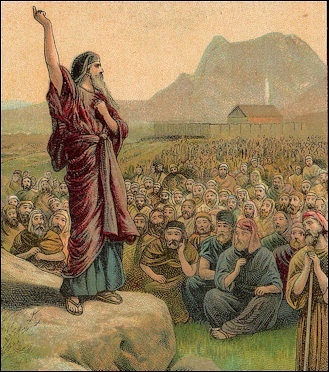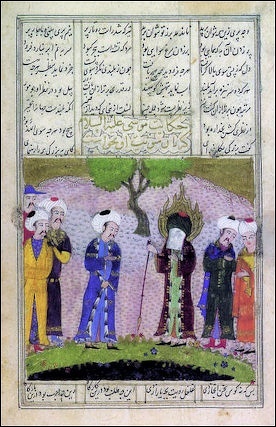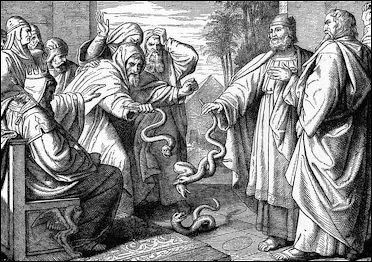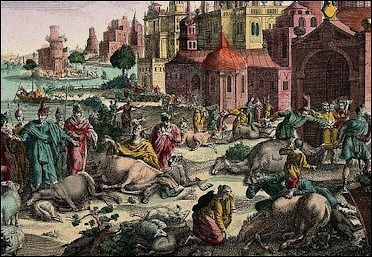Home | Category: Moses / Moses
MOSES RETURNS TO EGYPT, DEMANDING "LET MY PEOPLE GO"

Even though Moses was brought up as an Egyptian prince, he sympathized with the plight of his people. On one occasion he witnessed an Egyptian slavemaster about to kill a Hebrew slave, and intervened and killed the Egyptian. After that Moses was forced to flee Egypt. He found refuge in the desert where God appeared to him in a burning bush and ordered Moses to return to Egypt and demand the pharaoh to set the Children of Israel free. .[Source: Paul Mendes-Flohr Worldmark Encyclopedia of Religious Practices, 2000s, Encyclopedia.com]
Exodus 4:18 And Moses went and returned to Jethro his father in law, and said unto him, Let me go, I pray thee, and return unto my brethren which are in Egypt, and see whether they be yet alive. And Jethro said to Moses, Go in peace. 4:19 And the LORD said unto Moses in Midian, Go, return into Egypt: for all the men are dead which sought thy life. 4:20 And Moses took his wife and his sons, and set them upon an ass, and he returned to the land of Egypt: and Moses took the rod of God in his hand. [Source: King James Version of the Bible, gutenberg.org]
4:21 And the LORD said unto Moses, When thou goest to return into Egypt, see that thou do all those wonders before Pharaoh, which I have put in thine hand: but I will harden his heart, that he shall not let the people go. 4:22 And thou shalt say unto Pharaoh, Thus saith the LORD, Israel is my son, even my firstborn: 4:23 And I say unto thee, Let my son go, that he may serve me: and if thou refuse to let him go, behold, I will slay thy son, even thy firstborn.4:24 And it came to pass by the way in the inn, that the LORD met him, and sought to kill him.
4:25 Then Zipporah took a sharp stone, and cut off the foreskin of her son, and cast it at his feet, and said, Surely a bloody husband art thou to me. 4:26 So he let him go: then she said, A bloody husband thou art, because of the circumcision. 4:27 And the LORD said to Aaron, Go into the wilderness to meet Moses. And he went, and met him in the mount of God, and kissed him. 4:28 And Moses told Aaron all the words of the LORD who had sent him, and all the signs which he had commanded him.
4:29 And Moses and Aaron went and gathered together all the elders of the children of Israel: 4:30 And Aaron spake all the words which the LORD had spoken unto Moses, and did the signs in the sight of the people. 4:31 And the people believed: and when they heard that the LORD had visited the children of Israel, and that he had looked upon their affliction, then they bowed their heads and worshipped. 5:1 And afterward Moses and Aaron went in, and told Pharaoh, Thus saith the LORD God of Israel, Let my people go, that they may hold a feast unto me in the wilderness. 5:2 And Pharaoh said, Who is the LORD, that I should obey his voice to let Israel go? I know not the LORD, neither will I let Israel go.
Book: “Moses: A Life” by Jonathan Kirsh. Film: Cecil B. DeMille's “Ten Commandments” with Charleston Heston; “Prince of Egypt” , a Dreamworks animation with the voice of Moses supplied by Val Kilmer and his friend Ramses by Ralph Fiennes.
Websites and Resources: Bible and Biblical History: Bible Gateway and the New International Version (NIV) of The Bible biblegateway.com ; King James Version of the Bible gutenberg.org/ebooks ; Bible History Online bible-history.com ; Biblical Archaeology Society biblicalarchaeology.org ; Judaism Virtual Jewish Library jewishvirtuallibrary.org/index ; Judaism101 jewfaq.org ; torah.org torah.org ; Chabad,org chabad.org/library/bible ; Internet Jewish History Sourcebook sourcebooks.fordham.edu Christianity: BBC on Christianity bbc.co.uk/religion/religions/christianity ; Christian Classics Ethereal Library www.ccel.org ; Sacred Texts website sacred-texts.com ; Internet Ancient History Sourcebook: Christian Origins sourcebooks.fordham.edu ; Biblical Images: Bible in Pictures creationism.org/books ; Bible Blue Letter Images blueletterbible.org/images ; Biblical Images preceptaustin.org
Moses Returns to Egypt in the Muslim Story

Musa (Muslim Moses) with a cane in his hand
“Armed with the divine mission and the Book that was sent down to him which was to be the 'means of enlightenment to the people and a guidance and mercy to mankind', Moses left for Egypt with Aaron. They first went to the people and asked them to worship the true God. Moses showed them His Signs, but the people dismissed these as 'nothing but false magic' and laughed at him. He asked them to sacrifice a cow as an offering to God. 'What sort of cow?' they asked him in jest. Moses told them that God wanted a cow which was neither young nor old but of middle age. 'What about its color?' they asked. Moses said it should be deep and bright yellow. There were several cows of this color, they told Moses. [Source: BBC, September 4, 2009, jews-for-allah.org |::|]
“He clarified that it should be a cow that was neither yoked nor had ploughed any field; further, it was to be of sound mind and wholesome body. The people then realized what Moses meant; he wanted them to kill the golden cow that they and their forefathers had been worshipping. They asked Moses first to approach Pharaoh, their King, and if he agreed, they too would follow him.|::|
“Moses approached Pharaoh and appealed to him to give up his arrogance and high and mighty ways and to bow before the Lord, who was indeed the ruler of the world. Purify yourself, O Pharaoh, so that I may guide you to the right path. [29:18] Pharaoh was furious and asked Moses who was this God of his, whose messenger he claimed to be. Moses replied: Our Lord is the one who creates all things; He gives them form and then guides them. [20:50]|::|
“Pharaoh enquired about the generations that had passed away. Knowledge of them, Moses said, was with God alone. He then asked Pharaoh to look around and see the variety of God's creations — the rain, the wind, the cattle and the plants, all were the signs of His supremacy. Pharaoh asked Moses whether he had any proof of his prophethood. Moses threw down his staff and it became a live serpent. He then drew his hand out of the pocket of his cloak, and it shone with dazzling brightness.|::|
Who Was the Pharaoh in the Moses Story?
Jean-Pierre Isbouts wrote in National Geographic History: Unlike the pharaoh who knew Joseph, the pharaoh of Moses is cruel and vindictive. When Moses asks him to release the Israelites, Pharaoh makes the slaves work harder, depriving them of straw to make sun-dried mud bricks, even though the daily quota of finished bricks must remain the same (Exodus 5:7-8).
The identity of Pharaoh in the Moses story has been much debated, but many scholars are inclined to accept that Exodus has King Ramses II in mind. The Bible confirms that the Israelites were to build “supply cities, Pithom and Ramses, for Pharaoh.” Egyptian records confirm that the kings of the 19th dynasty (ca 1293–1185 B.C.E.) launched a major military program in the Levant. As part of this effort, King Seti I (ca 1290–1279 B.C.E.) built a new garrison city, which his successor, Ramses II (ca 1279– 1213 B.C.E.), later called Pi-Ramesses. Ramses II also built a second city dedicated to his personal patron, Atum, called Per Atum. These two cities are quite possibly the biblical Ramses and Pithom. [Source Jean-Pierre Isbouts, National Geographic History, December 29, 2018]
The Egyptian origin of the story is also emphasized by the name of “Moses.” The Book of Exodus says that his name is derived from the Hebrew verb moshe, which means “to draw out.” However, mose or moses is also a very common Egyptian patronymic, as in Tutmoses, meaning “son of Tut.”
Finally, the very first reference to “Israel” appears on the Victory Stela of Pharaoh Merneptah, one of Ramses’ sons. This monument is dated around 1207 B.C.E., which suggests that the Exodus story must be set in a time period prior to the reign of Merneptah, possibly between 1280 and 1220 B.C.E. No record of the exodus has been found in any Egyptian tablets, but that is not unusual; the new dynasty did not make a habit of recording its defeats. On the other hand, there are ample records of Semitic immigrant workers in Egypt, who may have drifted back to Syria-Canaan in the 13th century for a variety of reasons—including, perhaps, Ramses’ harsh policies of conscripting labor.
Moses Confronts the Pharaoh and Turns Aaron's Rod Into a Serpent

Aaron's rod changed into a serpent
Exodus 7:7: And Moses was fourscore years old, and Aaron fourscore and three years old, when they spake unto Pharaoh. 7:8 And the LORD spake unto Moses and unto Aaron, saying, 7:9 When Pharaoh shall speak unto you, saying, Shew a miracle for you: then thou shalt say unto Aaron, Take thy rod, and cast it before Pharaoh, and it shall become a serpent. 7:10 And Moses and Aaron went in unto Pharaoh, and they did so as the LORD had commanded: and Aaron cast down his rod before Pharaoh, and before his servants, and it became a serpent. [Source: King James Version of the Bible, gutenberg.org]
7:11 Then Pharaoh also called the wise men and the sorcerers: now the magicians of Egypt, they also did in like manner with their enchantments. 7:12 For they cast down every man his rod, and they became serpents: but Aaron's rod swallowed up their rods. 7:13 And he hardened Pharaoh's heart, that he hearkened not unto them; as the LORD had said. 7:14 And the LORD said unto Moses, Pharaoh's heart is hardened, he refuseth to let the people go. 7:15 Get thee unto Pharaoh in the morning; lo, he goeth out unto the water; and thou shalt stand by the river's brink against he come; and the rod which was turned to a serpent shalt thou take in thine hand. 7:16 And thou shalt say unto him, The LORD God of the Hebrews hath sent me unto thee, saying, Let my people go, that they may serve me in the wilderness: and, behold, hitherto thou wouldest not hear.
Moses Challenges the Pharaoh’s Magicians in the Muslim Story
“Pharaoh's chiefs said Moses was no more than a magician; they told Pharaoh: 'Call the best of magicians from our cities to counter his magic'. Moses agreed to face them, and the Festival Day was fixed for the event. Two of the best magicians confronted Moses. They threw their ropes and staves at Moses, which turned into serpents and coiled around him. [Source: BBC, September 4, 2009, jews-for-allah.org |::|]
“Moses prayed to his Lord for help. The Lord told him not to lose nerve, and commanded: Throw your staff down and it will swallow everything which they have faked here; theirs are only magic tricks, what you have is real. No magician ever thrives, whatever he may do or wherever he may go. [20:69] |::|
“Moses threw his staff on the ground and it turned into a bigger serpent which swallowed all the other serpents. The magicians were wonderstruck and at once prostrated themselves, declaring that they believed in the God of Moses and Aaron. Pharaoh thundered with rage: 'How dare you do so without my leave?' He warned them that he would cut off their hands and feet on alternate sides and crucify them on the trunks of palm trees if they did not desist from following Moses.|::|
“The magicians showed no fear and told Pharaoh that he could do what he liked with them but they would not retract from the clear path shown by Moses. They believed that his God was superior to Pharaoh. They asked for the forgiveness of the Lord for the sins of sorcery that Pharaoh had compelled them to commit.” |::|
Plagues of Egypt
Moses returned to Egypt and confronted the Pharaoh: "Thus saith the Lord God of Israel, Let my people go." When Moses first asked the Pharaoh to let his people go the Pharaoh responded by increasing the Israelites work load. Then, not only were they required to make and carry bricks, they also had to raise and harvest straw as binder for the bricks.☼

Fifth Plague: cattle dying
When the Pharaoh refused again the Ten Plagues of Egypt were unleashed on the land one after another.
The first plague - river water turned to blood
The second plague - frogs
The third plague - gnats
The fourth plague - flies
The fifth plague - death of livestock
The sixth plague - boils
The seventh plague - hail
The eighth plague - locusts
The ninth plague - darkness
The tenth plague - death of the firstborn|
In the First the Nile turned to blood, a phenomena some scholars say might have been caused by red mud pouring down the river from Ethiopia. The plagues of frogs, lice, flies, cattle disease and bolis that followed, they say, are conditions usually associated with seasonal floods. The seventh plague, hail and fire, may have been a hailstorm with lightning or a volcanic eruption in the Mediterranean. The eight plague, locusts, still swarm from time to time. The three days of darkness that followed may have been a sandstorm.
See Separate Article PLAGUES OF EGYPTS africame.factsanddetails.com
Tenth Plague, Passover and The Beginning of the Exodus
It was the tenth plague — the plague of the firstborn — which eventually persuaded the Pharaoh to let the Israelites go. It was announced that the first-born sons in every household would die, but the sons of the Israelites would be saved if they marked their door posts with the blood of a lamb killed in sacrifice. They had to cook the lamb and eat it that night with bitter herbs and unleavened bread. These are the origins of the Jewish Festival: Passover. [Source: BBC]
In the tenth plague the firstborn of every Egyptian family was killed, even the pharaoh's oldest son. Exodus 12:29 in the Bible reads: "at midnight the Lord smote all the firstborn of the land of Egypt, from the firstborn of the Pharaoh that sat on his throne unto the firstborn of the captive that was in the dungeon." Historians have yet to find any evidence of this event.
Finally after the tenth plague the Pharaoh at last let Moses and the Israelites go. Before the plague struck Israelites were told to sacrifice a lamb and paint their doorways with its blood. Their homes were passed over by the plague, which is the origin of the Passover holiday. During Passover, Jews eat unleavened bread or matzo. The explanation for this tradition is that the Jews were forced to pack up and leave Egypt so quickly they didn't have time to leaven their bread.☼
Image Sources: Wikimedia, Commons, Schnorr von Carolsfeld Bible in Bildern, 1860
Text Sources: Internet Jewish History Sourcebook sourcebooks.fordham.edu “World Religions” edited by Geoffrey Parrinder (Facts on File Publications, New York); “ Encyclopedia of the World’s Religions” edited by R.C. Zaehner (Barnes & Noble Books, 1959); “Old Testament Life and Literature” by Gerald A. Larue, New International Version (NIV) of The Bible, biblegateway.com; Wikipedia, National Geographic, BBC, New York Times, Washington Post, Los Angeles Times, Smithsonian magazine, Times of London, The New Yorker, Reuters, AP, AFP, Lonely Planet Guides, and various books and other publications.
Last updated March 2024
